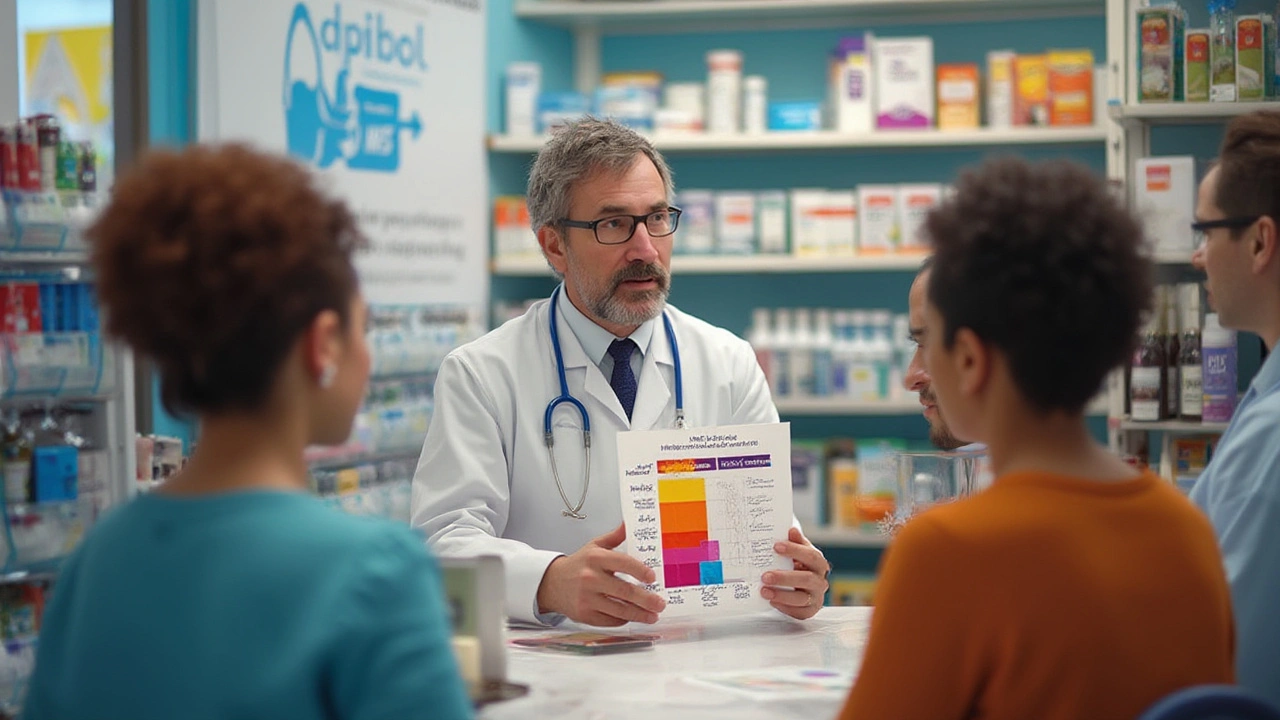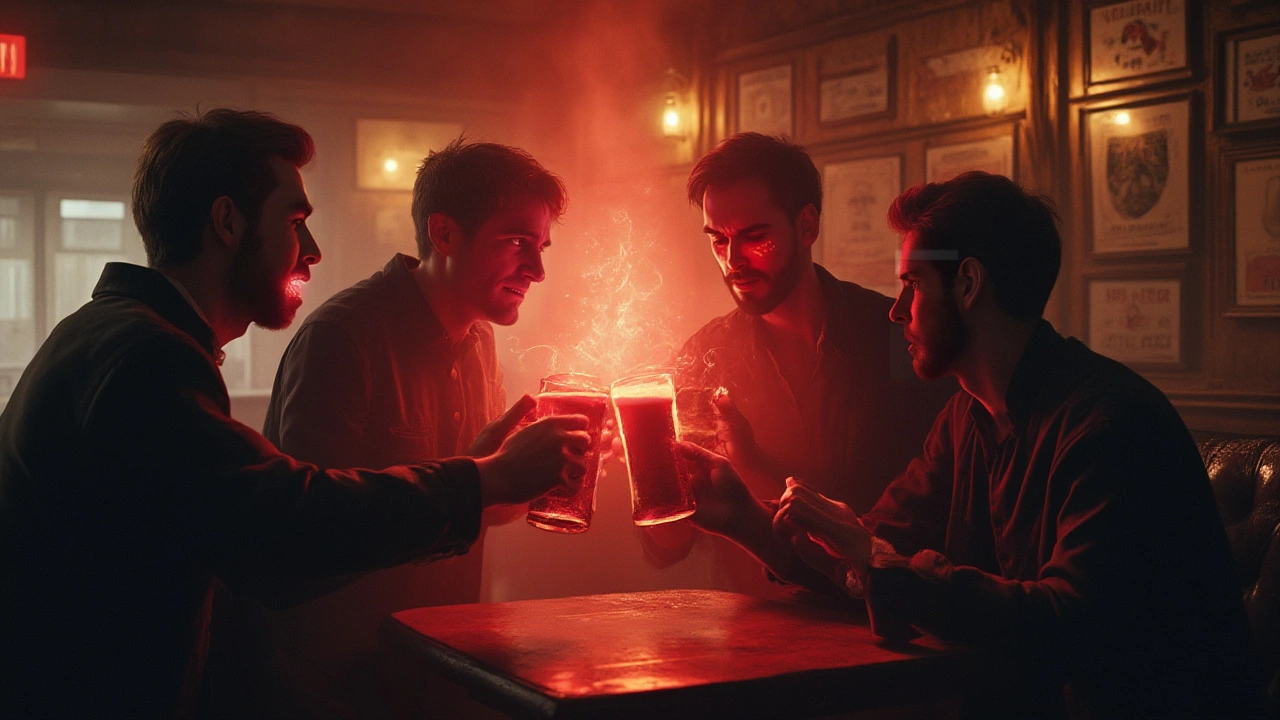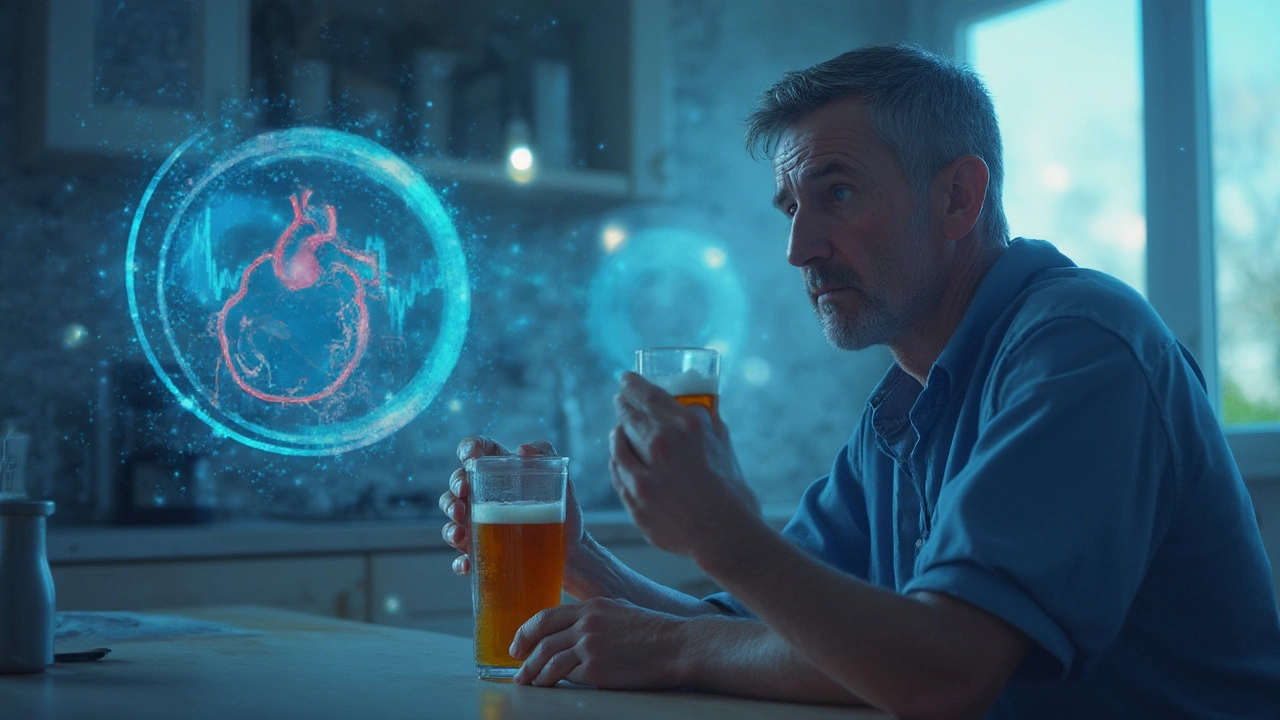People love a cold drink now and then, and plenty of folks rely on meds like spironolactone to control high blood pressure, heart failure, or fluid retention. But toss the two together, and it's like lighting a fuse you can't see—something dangerous starts brewing under the surface. Few realize that a night out with booze, when you're on potassium-sparing diuretics, can push potassium levels frighteningly high—triggering what's known as hyperkalemia. And sometimes, the results are anything but subtle: heart palpitations, muscle weakness, even a trip to the ER. Mixing alcohol and spironolactone isn't just a gentle nudge to your kidneys; it's a silent risk that deserves way more attention.
How Alcohol and Potassium-Sparing Diuretics Throw Your Body Off Balance
Let's break it down: spironolactone isn't just any pill. It's part of a group called potassium-sparing diuretics—meds famous for helping your body drop extra fluid but keeping potassium locked in. Normally, that's a big plus. Potassium is key for everything from muscle contractions to keeping your heart on beat. But the problem pops up when there's too much. If the body can't flush out potassium, your heart goes haywire, even shutting down in extreme cases.
Now, slide alcohol into the picture. Booze does a number on your system, with some serious dehydration and changes in how your kidneys work. Mix that with a drug whose whole job is to spare potassium, and you set the stage for a dangerous spike. Consuming several drinks reduces your body's ability to process both sodium and potassium efficiently. That means potassium stacks up even faster in your bloodstream.
Here's a fact that'll make you pause: normal potassium levels hover between 3.6 and 5.2 mmol/L. Go above 5.5, and doctors start to worry. Anything over 6 mmol/L becomes a medical emergency. Even healthy people sometimes tip into trouble after a binge drinking session, but with spironolactone in your system, the bar for danger gets much lower. It's like double vision but for your kidneys—they're struggling to keep up in every direction.
And since alcohol dehydrates you, blood potassium gets even more concentrated. Not surprisingly, studies have shown that people taking potassium-sparing meds who drink heavily are way more likely to land in the ER with heart rhythm disturbances or sudden muscle weakness. In one 2022 analysis, about 28% of patients combining high-dose spironolactone with regular drinking required potassium-lowering treatments within a year.
You might think "But I feel fine." The kicker is that most people can't tell when their potassium is creeping up. Symptoms, when they show up, can masquerade as fatigue, nausea, or cramping—easy to mistake for a hangover. Only when things get out of hand do warning flags wave: palpitations, chest pain, or even fainting. By then, you're in the deep end.
Booze also impacts the liver, slowing down how your body metabolizes drugs like spironolactone. That can make the medication linger longer, amplifying the risk of potassium buildup. And if you're popping over-the-counter NSAIDs for your hangover, you're tossing more logs on the fire. These painkillers further blunt your kidneys' natural potassium filtering.
This isn't just theory—there are stories from ERs across the world of young and old patients crashing with heart arrhythmias after a night out, the common thread being a prescription for a potassium-sparing diuretic. It's easy to overlook, but lives have been lost because that risk didn't get flagged soon enough.

Who’s at Risk and What Makes the Mix So Volatile?
It's tempting to think this only hits people who already have kidney disease or heart trouble, but that's not the whole picture. Sure, if your kidneys are already lagging, they can't clear potassium well, so you’re at greater risk. But even someone with perfectly healthy kidneys can get in trouble when cocktails and spironolactone collide repeatedly.
Certain groups really do have to watch their step: older adults, folks with diabetes, people taking other blood pressure meds, or those popping potassium supplements or eating potassium-rich foods like bananas, oranges, avocados, and potatoes. But it's a mistake to assume younger people are safe just because their bodies bounce back faster. A few wild weekends can be enough to overload the system, especially at higher drug doses.
Let's talk numbers for a second. In one hospital dataset, admissions for hyperkalemia jumped by 18% in patients combining spironolactone with moderate to heavy drinking habits. Nearly two-thirds didn’t realize their symptoms—weakness, numbness, skipped heartbeats—were anything serious until doctors ran lab tests. Most weren't aware you could even have too much potassium. And get this: the tipping point isn't always a heavy bender. For some, even a couple of drinks with dinner and daily spironolactone is enough to trigger a spike if they're run down, mildly dehydrated, or stressed.
Food matters, too. Potassium is everywhere—beans, dried fruits, leafy greens, yogurt, coconut water. Pair a high-potassium diet with meds and alcohol, and the odds stack up quickly. Your body just can't bail you out fast enough. Add in strenuous workouts that already shift potassium out of muscle cells and into the blood, and you’ve got another layer of risk. Table below shows a few hidden potassium sources:
| Food/Beverage | Potassium Content (mg per serving) |
|---|---|
| Baked potato (with skin) | 925 |
| Orange juice | 470 |
| Avocado (whole) | 970 |
| Coconut water (1 cup) | 600 |
| Spinach (cooked, 1 cup) | 840 |
| Soybeans (edamame, 1 cup) | 675 |
So who really needs to watch out? Anyone prescribed a high dose of spironolactone—especially over 50mg daily, or who’s on it long-term. But also anyone stacking up risk factors: low fluid intake, high-potassium food, all-nighters, or those infamous "hair of the dog" mornings. Even short-term use with a tough night of drinking can land you in hot water.
Being dehydrated is another massive trigger. After a few drinks, the body loses more water than you bring in—your kidneys can’t compensate, and what should be a slow leak turns into a dam bursting. Next thing you know, potassium that should’ve filtered out is floating free, throwing off every cell in your body.
Then there's the issue of self-medicating. People recovering from a salty meal or hangover might reach for "natural" remedies—sports drinks or mineral waters loaded with, yes, potassium. Combined with spironolactone, these seem harmless but can push the numbers over the edge fast.
Throw in a warm climate, heavy sweating, and skipping a meal, and the effect only multiplies. Your kidneys quickly lose their fine-tuned balance when they’re hit from all angles. That’s why the warning bells should ring for anyone using these medications—even if they figure they're tough enough to handle a bit of party.

How to Stay Safe: Tips, Warning Signs, and Crucial Conversations
No one's saying you have to live like a monk if you're prescribed spironolactone or another potassium-sparing diuretic, but knowledge is your best wingman here. The trick is making sure you spot the risks before they sneak up on you—and that means staying alert and having real talk with your healthcare provider.
First up, flag your drinking habits from the start. When a doc prescribes spironolactone, ask directly about alcohol—don’t just read the fine print. If you're someone who enjoys social drinking, be upfront. Chances are, they’ll suggest cutting back or spacing your drinks further from your meds. Sometimes, switching to a different blood pressure med without the potassium spike issue is a smarter move. Your doctor needs the real story, not the edited version.
Keep an eye on how you feel. Early signs of trouble with potassium are vague—tiredness, mild confusion, weird muscle cramps, numbness, or just feeling off. It can escalate to skipped heartbeats, fluttering in your chest, or trouble breathing. If you notice any of these—especially after a session of drinking and your usual meds—call your clinic or, if it’s severe, head straight to urgent care.
Make it a habit to check your blood work every few months, or more often if you’re on a high dose or have changed your drinking patterns. Most labs check potassium as part of a basic metabolic panel, but ask your doctor to spell out the results for you. Normal range is 3.6-5.2 mmol/L. Anything over 5, and you’ll want to pause on the pub. Working out in the summer heat, fasting, or even viral illnesses can push your levels up before you realize it.
Food choices matter. If you’re drinking, skip the avocado toast and baked potatoes that day. Watch out for high-potassium drinks like coconut water or certain sports beverages. Read ingredient labels on "healthy" snacks—those dried apricots and protein bars pack a secret punch. No need to cut them out forever, but don’t stack them with booze and meds at the same time.
Don't go silent about over-the-counter painkillers, supplements, and "natural" remedies. Ibuprofen, potassium tablets, salt substitutes, herbal teas—these can tip the scales when you’re least expecting them. Always check with your doc before adding anything new to your lineup.
Random tip: Some folks set reminders on their phone for both their meds and a glass of water—double protection. Not a bad idea after a late night.
The big takeaway? If you’re juggling spironolactone and drinks, treat it with respect. Staying hydrated—water, not alcohol—is non-negotiable. Having bloodwork checked at least every 3-6 months if you’re on a steady routine is smart. And don't be shy about asking your doc or pharmacist for a personalized risk rundown.
If you're curious for a deep dive into what happens when spironolactone and booze collide, plus real stories and pro tips, check out spironolactone alcohol risks—it unpacks what to do when temptation strikes and your safety's on the line.
No one likes boring health lectures, but with potassium, the danger doesn’t shout. It whispers. So next time you reach for that second cocktail with your daily meds, remember: the mix that feels harmless can pack a punch. Know your numbers, listen to your body, and keep the lines open with your healthcare provider. That's how you make it through the night safer—and with your heartbeat steady the next morning.


7 Responses
bro i took spironolactone for acne and had a few beers last weekend and woke up feeling like my heart was gonna punch through my ribs. thought it was just a hangover. turned out my potassium was at 6.1. ER trip. don’t be me.
It is profoundly concerning that the general populace continues to conflate recreational substance use with pharmacological safety profiles without consulting peer-reviewed clinical literature. The pharmacokinetic interaction between alcohol and spironolactone is well-documented in the Journal of Clinical Pharmacology, Vol. 62, Issue 4, wherein renal tubular potassium retention is exacerbated by ethanol-induced hypoaldosteronism. One must exercise intellectual rigor before engaging in such reckless polypharmacy.
oh my god i just realized i’ve been eating avocado toast every morning with my spiro and a glass of wine. no wonder i’ve been feeling like a zombie. i’m not even mad, i’m just impressed at how efficiently i’ve been slowly murdering myself. 🙃
also coconut water? are you kidding me? that stuff is potassium crack. i’m done.
How is it even possible that people still don’t know this? You’re on a potassium-sparing diuretic, you’re not in a wellness retreat. The fact that you think "a couple drinks" is fine shows a complete disregard for basic physiology. And don’t get me started on people who think "natural" means safe-coconut water is just potassium in a fancy bottle. You’re not a detox goddess, you’re a walking electrolyte disaster.
man i’ve been on spiro for like 2 years and i drink maybe once a month, but i never thought about how my food choices stack up. i love my sweet potatoes and spinach smoothies… guess i need to stop doing that the night after i have a beer. thanks for the wake-up call. i’m gonna start drinking more water and maybe check my labs soon. we all just wanna live, right? 🙏
The data presented here is statistically sound but lacks nuance in stratifying risk by dosage, duration of use, and concomitant medication profiles. A blanket warning against alcohol consumption is an overgeneralization that undermines patient autonomy. Moreover, the cited 2022 analysis fails to control for dietary potassium intake as a confounder, rendering its conclusions suspect. One must interrogate methodology before accepting clinical admonitions.
Thank you for this thorough and compassionate breakdown. I am a nurse and see this exact scenario far too often-patients unaware of the silent danger, dismissing symptoms as "just tired" or "a bad night." I encourage everyone reading this to have an honest conversation with your provider, not just to avoid emergencies, but to live with intention. Your body is not a machine to be pushed; it’s a delicate balance you’re entrusted to protect.